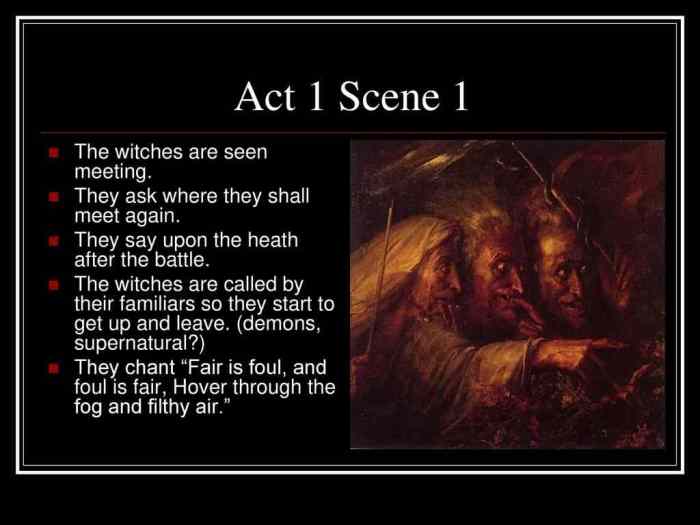In response to macbeth’s questions the witches – In William Shakespeare’s tragic masterpiece, Macbeth, the enigmatic witches’ prophecies play a pivotal role in shaping the play’s central themes and driving the protagonist’s fateful actions. These prophecies, delivered in a haunting and ambiguous manner, serve as both a catalyst for Macbeth’s ambition and a harbinger of his eventual downfall.
The witches’ three prophecies to Macbeth, consisting of his elevation to Thane of Cawdor, his future kingship, and the warning of his downfall by Macduff, set in motion a chain of events that inexorably lead to tragedy. Macbeth’s initial reaction to the prophecies is one of astonishment and disbelief, yet they gradually become an obsession that fuels his ambition and drives him to commit heinous crimes.
Introduction: In Response To Macbeth’s Questions The Witches

William Shakespeare’s Macbethis a timeless tragedy that explores the destructive power of ambition. The play’s central themes include the corrupting influence of power, the consequences of betrayal, and the struggle between good and evil.
One of the most significant elements of the play is the witches’ prophecies. These prophecies set in motion a chain of events that ultimately lead to Macbeth’s downfall.
The Witches’ Prophecies
The witches’ three prophecies to Macbeth are as follows:
- You will be Thane of Cawdor.
- You will be King of Scotland.
- Beware of Macduff.
The first two prophecies come true quickly, which leads Macbeth to believe that the third prophecy will also come true. This belief fuels his ambition and drives him to commit murder.
Macbeth’s Response
Macbeth’s initial reaction to the prophecies is a mixture of excitement and fear. He is excited by the prospect of becoming king, but he is also afraid of the consequences of his actions.
As the prophecies continue to come true, Macbeth’s ambition grows. He becomes increasingly paranoid and ruthless, and he is willing to do anything to maintain his power.
The Consequences of Macbeth’s Actions
Macbeth’s actions have devastating consequences. He kills King Duncan, his friend Banquo, and many others. His reign is marked by tyranny and bloodshed.
In the end, Macbeth is defeated by Macduff. He is killed in battle, and his prophecy is fulfilled.
Literary Devices and Techniques, In response to macbeth’s questions the witches
Shakespeare uses a variety of literary devices and techniques to create suspense and tension in the play.
- Foreshadowing: Shakespeare uses foreshadowing to hint at the events that will happen later in the play.
- Irony: Shakespeare uses irony to create a sense of dramatic irony, where the audience knows more than the characters.
- Suspense: Shakespeare uses suspense to keep the audience on the edge of their seats.
These devices and techniques contribute to the overall impact of the play, making it a powerful and unforgettable tragedy.
Themes and Motifs
The play explores a number of important themes, including ambition, guilt, and the supernatural.
- Ambition: Macbeth’s ambition is the driving force behind his actions. He is willing to do anything to become king, even if it means killing his own friends and family.
- Guilt: Macbeth is haunted by guilt after he kills Duncan. He is unable to escape the consequences of his actions, and he eventually goes mad.
- The supernatural: The play is filled with supernatural elements, such as the witches and the ghost of Banquo. These elements add to the sense of suspense and tension.
These themes and motifs are developed throughout the play, and they help to create a rich and complex work of literature.
Critical Interpretations
The play has been interpreted in a variety of ways by critics. Some critics see it as a tragedy about the corrupting influence of power, while others see it as a story about the dangers of ambition.
There is no one definitive interpretation of the play. However, the different interpretations all offer valuable insights into the play’s themes and characters.
FAQ Corner
What is the significance of the witches’ prophecies in Macbeth?
The witches’ prophecies serve as a catalyst for Macbeth’s ambition, driving him to commit heinous crimes in his pursuit of power. They also foreshadow his eventual downfall, highlighting the destructive consequences of unchecked ambition.
How do the witches’ prophecies influence Macbeth’s thoughts and actions?
The prophecies instill in Macbeth a belief in his own destiny and fuel his ambition to become king. However, they also create a sense of paranoia and guilt, ultimately leading to his downfall.
What is the role of fate and free will in Macbeth’s tragedy?
The play explores the complex interplay between fate and free will. While the witches’ prophecies seem to predetermine Macbeth’s destiny, his own choices and actions ultimately shape his fate.